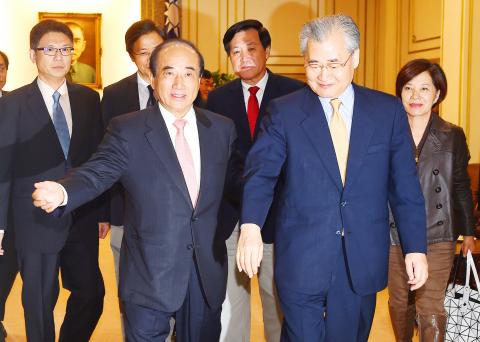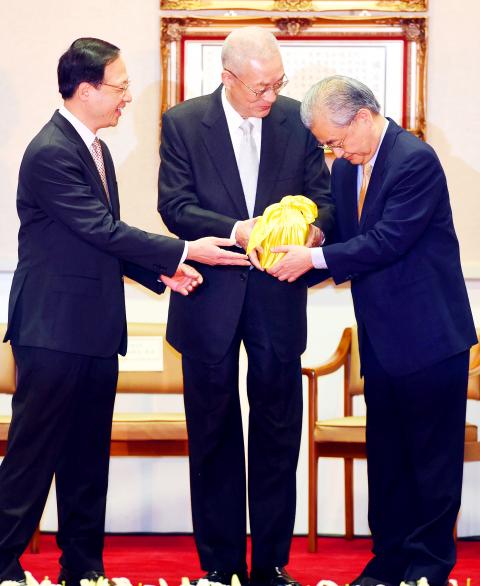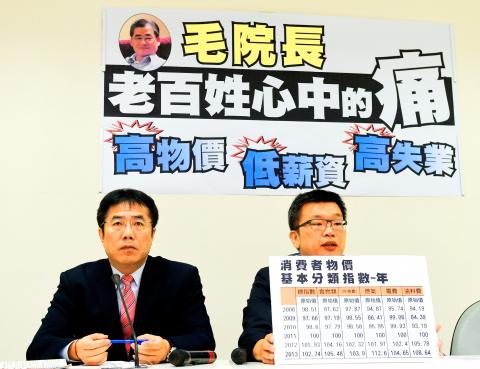Premier Mao Chi-kuo (毛治國) yesterday said that his Cabinet will seek to understand the public’s needs with humility and strive to improve communication with the public.
Mao, who served as vice premier in the previous Cabinet, said the challenges he faces in his new position far exceed the scale of any crisis he has dealt with before.
“However, with my engineering background, I do not have the right to run away from the difficulties I face,” Mao said, adding that he always manages to find the best solution to any problem he encounters.

Photo: Chien Jung-fong, Taipei Times
By building on the work of former premier Jiang Yi-huah (江宜樺) and the members of Jiang’s Cabinet, Mao said he hopes to understand the public’s needs, adopt a more humble attitude and to have more effective communication.
The new Cabinet must pay attention to the demands of Internet users and take effective action to help young people fulfill their dreams, Mao said.
Jiang, who resigned on Nov. 29 to take responsibility for the Chinese Nationalist Party’s (KMT) heavy losses in the nine-in-one elections, said he will leave behind the passion of politics and resume a free and ordinary life.

Photo: Lo Pei-der, Taipei Times
While some of his government’s missions were accomplished, there was “some distance” to go to achieve the goal he set for his administration when he became premier 22 months ago: to build “a rich and polite democracy,” Jiang said, in an apparent reference to the government’s low approval ratings.
After the swearing-in and handover ceremonies, Mao visited the KMT caucus and Legislative Speaker Wang Jin-pyng (王金平).
Wang said he told Mao to formulate well-considered policies that take into account the opinions of lawmakers and the public.

Photo: Chien Jung-fong, Taipei Times
Meanwhile, the Democratic Progressive Party (DPP) caucus criticized Mao visiting to the KMT caucus before for visiting Wang, asking if he considers the party more important than the legislature.
“Apparently, Mao considers the will of the party to be his priority, as he chose to pay a visit to the KMT caucus immediately after he was sworn in, prior to visiting the legislative speaker,” DPP Legislator Huang Wei-che (黃偉哲) told a news conference.
“If Mao chooses to listen to his party, not the public, we will give him a hard time during the question-and-answer session on Friday,” Huang said.
DPP caucus whip Tsai Chi-chang (蔡其昌) said he had yet to receive word that Mao is planning to meet with the DPP caucus.
The DPP caucus also called on Mao to focus on solving the major issues affecting Taiwanese: inflation, stagnant incomes and high unemployment.
“Compared with 2011, average consumer prices went up 2.74 percent last year. If we break it down, food has gone up by 5.48 percent and fuel prices have increased by 12.6 percent,” Tsai said.
Of the 8.7 million people with jobs, the average monthly income is NT$35,986, but 43 percent make between NT$30,000 and NT$50,000, while as many as 40 percent make less than NT$30,000, Tsai said.
“This is about the same amount of money people were making 15 years ago,” he said.
“The unemployment rate this year has been 3.95 percent, with about 457,000 people without jobs. The unemployment rate is higher than the 3.5 percent in South Korea, 3.6 percent in Japan and 3.3 percent in Hong Kong,” Tsai said.
These three problems were the result of President Ma Ying-jeou’s (馬英九) lack of leadership over the past six years, the lawmaker said.
“These should be the first problems that the Cabinet solves, otherwise the political tsunami will continue to hit and the public’s anger will not abate,” the DPP whip said.

The US government has signed defense cooperation agreements with Japan and the Philippines to boost the deterrence capabilities of countries in the first island chain, a report by the National Security Bureau (NSB) showed. The main countries on the first island chain include the two nations and Taiwan. The bureau is to present the report at a meeting of the legislature’s Foreign Affairs and National Defense Committee tomorrow. The US military has deployed Typhon missile systems to Japan’s Yamaguchi Prefecture and Zambales province in the Philippines during their joint military exercises. It has also installed NMESIS anti-ship systems in Japan’s Okinawa

‘WIN-WIN’: The Philippines, and central and eastern European countries are important potential drone cooperation partners, Minister of Foreign Affairs Lin Chia-lung said Minister of Foreign Affairs Lin Chia-lung (林佳龍) in an interview published yesterday confirmed that there are joint ventures between Taiwan and Poland in the drone industry. Lin made the remark in an exclusive interview with the Chinese-language Liberty Times (the Taipei Times’ sister paper). The government-backed Taiwan Excellence Drone International Business Opportunities Alliance and the Polish Chamber of Unmanned Systems on Wednesday last week signed a memorandum of understanding in Poland to develop a “non-China” supply chain for drones and work together on key technologies. Asked if Taiwan prioritized Poland among central and eastern European countries in drone collaboration, Lin

Renewed border fighting between Thailand and Cambodia showed no signs of abating yesterday, leaving hundreds of thousands of displaced people in both countries living in strained conditions as more flooded into temporary shelters. Reporters on the Thai side of the border heard sounds of outgoing, indirect fire yesterday. About 400,000 people have been evacuated from affected areas in Thailand and about 700 schools closed while fighting was ongoing in four border provinces, said Thai Rear Admiral Surasant Kongsiri, a spokesman for the military. Cambodia evacuated more than 127,000 villagers and closed hundreds of schools, the Thai Ministry of Defense said. Thailand’s military announced that

CABINET APPROVAL: People seeking assisted reproduction must be assessed to determine whether they would be adequate parents, the planned changes say Proposed amendments to the Assisted Reproduction Act (人工生殖法) advanced yesterday by the Executive Yuan would grant married lesbian couples and single women access to legal assisted reproductive services. The proposed revisions are “based on the fundamental principle of respecting women’s reproductive autonomy,” Cabinet spokesperson Michelle Lee (李慧芝) quoted Vice Premier Cheng Li-chiun (鄭麗君), who presided over a Cabinet meeting earlier yesterday, as saying at the briefing. The draft amendment would be submitted to the legislature for review. The Ministry of Health and Welfare, which proposed the amendments, said that experts on children’s rights, gender equality, law and medicine attended cross-disciplinary meetings, adding that